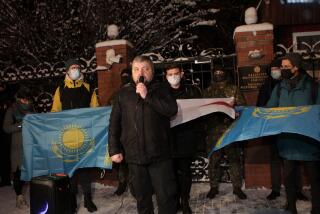Too Much Sympathy, Too Little Analysis : LECH WALESA AND HIS POLAND by Mary Craig (Continuum: $18.95; 326 pp.)
- Share via
About 10 years after the Soviet intervention in Czechoslovakia in August, 1968, which put an end to the “Prague Spring” that symbolized the Czechoslovak political liberalization, a special bibliography published in the United States listed more than 600 books and articles devoted to Czechoslovakia.
It can be safely assumed that the sheer volume of publications dealing with Poland in the 1980s, with the “Solidarity” movement and with its leader, Lech Walesa, has already exceeded that figure, even though only slightly more than seven years have elapsed since the dramatic events of the summer of 1980 that marked the beginning of the current Polish crisis.
In light of the huge amount of published material already on the bookshelves, the author, Mary Craig, must be either commended for her courage or criticized for her chutzpah in writing still another book about Poland in the post-World War II period. Craig seems to justify her determination to produce the book by claiming that her own association with Poland goes back more than 20 years and that her major aim was to give her readers “some idea of just what the Polish experience has been in this most terrible of centuries” and to clear up “some of the many misunderstandings”--presumably about Poland--”which prevail in the West.”
This is clearly a most laudable goal, and one wishes one could state unequivocally that the author succeeded in her noble endeavor. Alas, this is not the case. I regret to say that, in general, Craig managed admirably to confuse the various issues rather than to clarify them. She ought not be blamed too harshly, however: Postwar Polish history has defied better minds than hers, and trying to squeeze 40 years of Polish history into a book of about 300 pages was (and most likely is) a “Mission Impossible.”
As the title suggests, this was to be a book about both Walesa, the almost legendary leader of Solidarity and winner of the Nobel Peace Prize for 1985, and his Poland. On the one hand, this approach looks attractive. After all, Walesa was a product of his time, and his mind-set and world view were undoubtedly influenced by the turbulent events of the ‘60s and ‘70s in his homeland. On the other hand, there is really little, if any, linkage between young Walesa’s growing up in the ‘40s and ‘50s--he was born in 1943 in a small village northwest of Warsaw--and both the Communist takeover and the Stalinist rule in Poland, which are also discussed at some length in the book.
The two narratives--Walesa’s personal life story and the historical events in Poland over the last 40 years--move separately on their parallel tracks and never really get together. As a result, the reader is left wondering about the connection between the two. For example, was Walesa, a shipyard electrician with barely an elementary education, an accident of history or was his ascendance to national leadership in 1980-1981 inevitable, resulting from the failure of the traditional Polish elites to seize leadership? If, indeed, the historical elites abandoned, for one reason or another, their traditional leading role, was it because they were no longer followed by the Polish masses, who preferred to put their trust in a representative of a new Polish elite? Was the ultimate downfall of Solidarity essentially the responsibility of Walesa and his lack of experience, or was the democratic experiment doomed from the outset?
These are just three of many questions that come to mind and to which Craig provides no answer. I have a feeling that one of the reasons is her fondness for Poles and her willingness to excuse weakness of character or political errors. I am afraid that it is her uncritical attitude toward the chief subject of her study, Lech Walesa, whom she often treats in an almost hagiographic manner, that detracts from an otherwise well-written book. Sympathy is no substitute for thorough analysis. A reader can only hope that one day the author may be able to take a more detached view of both Poland and its people and write a more objective study of both.
More to Read
Sign up for our Book Club newsletter
Get the latest news, events and more from the Los Angeles Times Book Club, and help us get L.A. reading and talking.
You may occasionally receive promotional content from the Los Angeles Times.










